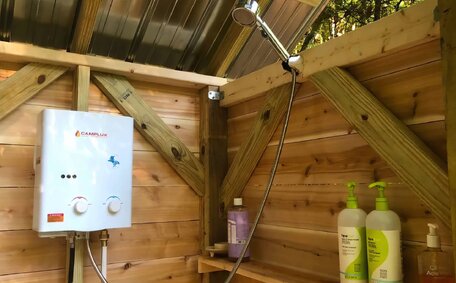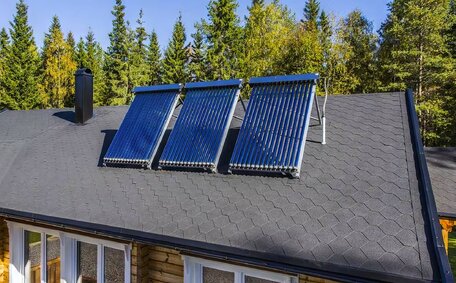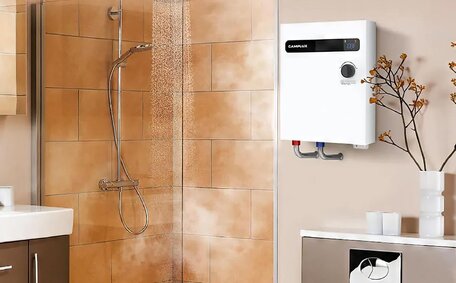How to Improve the Efficiency of Your Hot Water System
A well-calibrated electric hot water heater is essential for steady hot water supply, and when optimised, it can help homeowners reduce energy costs and environmental impact.
At Cranebrook Plumbing, we specialise in fine-tuning tankless hot water systems from our Sydney base, helping customers optimise their systems and lower operating expenses.
This article outlines various methods to enhance the efficiency of your hot water heater, leading to cost savings. If you need personalised advice, our licensed plumbing professionals are ready to assist.
Through strategic heat pump upgrades and setting adjustments, the performance of hot water heaters may surpass expectations, resulting in lowered energy consumption and costs.
We offer practical tips for recalibrating your hot water unit, which can help reduce energy bills and environmental impact.
Checking and Adjusting Your Hot Water System’s Temperature
Checking and adjusting your hot water system’s temperature is one of the easiest ways to improve efficiency and reduce energy costs. Here are some tips:
Locate the Thermostat
The thermostat’s gas control valve, typically accompanied by a visible pilot light, regulates your tank’s water temperature. It’s usually found near the top of the tank or within the access panel on the side of the unit. Look for a control knob you can turn to adjust the temperature.
Check Current Temperature Setting
Activate the hot tap, ensuring full engagement of the control knob, and use a thermometer to measure the hot water temperature accurately. Many homes have thermostats set between 60-75°C, but efficiency can improve by setting the temperature at the lower end of this spectrum. Higher temperatures can cause efficiency losses, leading to excessive heat loss and energy usage.
Adjust Temperature to the Recommended Range
Adjusting your water heater’s thermostat to 50-60°C, particularly during offpeak hours, can quickly supply hot water and improve efficiency. Lowering the temperature by 5°C could reduce heating expenses up to 10%, but it should remain above 50°C to prevent bacterial growth.
Insulate Pipes
Insulating your hot water pipe network prevents heat loss as heated water travels to taps and showers. Use quality pipe insulation rated to withstand temperatures over 100°C.
Install Heat Traps
Heat traps, positioned between water heater sections and functioning like a heat exchanger, are key in maintaining the supply temperature within pipes, ensuring the water heater can avoid unnecessary mixing of hot and cooler water in the tank. Installing them above and below the storage tank corrects inefficiencies associated with return water temperature mixing.
A brief adjustment of temperature settings can significantly affect your water heater’s efficiency and your energy costs. Contact your professional plumber at Cranebrook Plumbing for expert guidance on tuning your natural gas system for optimal performance.
Insulating Your Hot Water System and Pipes
Wrap your system with insulation blankets or batts, choosing materials with an R-value of at least R3.0, suitable for temperatures above 100°C. Cutting and sealing the insulation correctly ensures minimal thermal leakage.
Insulating pipes prevents up to 40% of standby heat losses. Slide insulation over pipes, wrapping elbows and joints fully.
Use pre-split foam tubing or fibreglass strips with at least 13mm thickness. Seal seams with aluminium tape and ensure insulation meets AS/NZS 4859.1 compliance standards.
With proper insulation, you could notice significant energy savings in your house, with even a noncondensing boiler saving you 15-45% on your water heater costs. Your local licensed plumber at Cranebrook Plumbing can recommend the best insulation solutions for your home. Please contact us today to maximise energy savings and hot water system efficiency.
Seal seams with ction Valves
Installing heat traps and anti-convection valves is a straightforward way to enhance your hot water system’ tank’s inlet and outlet pipes that close when hot water exits, reducing standby energy losses.
Installing heating system heat traps involves cutting the inlet and outlet pipes, inserting the one-way valves, and reconnecting the pipes. Ensure valves are installed in the correct directions. Heat traps can reduce standby losses by up to 40%.
Anti-Convection Valves
Anti-convection valves prevent the natural upward flow of hot water and downward flow of cooler water, reducing unnecessary heat dissipation.
They are installed on each hot water faucet pipe connected to fixtures. The gas valve acts as a control, shutting off water flow when hot water isn’t in demand and prevents unnecessary circulation between the tank and piping.
The Cranebrook Plumbing team supplies and installs heat traps and anti-convection valves suitable for condensing boilers, helping you boost efficiency. Reach out for expert advice that can lead to reduced energy costs.
Draining Sediment to Maintain Efficiency
Regular draining of sediment buildup in your hot water system helps prevent scale formation and corrosion, thus enhancing efficiency and extending the unit’s lifespan.
Flushing the sediment from your boiler plant, an integral part of the power supply chain, is a straightforward process that should be done annually, or more frequently if you have hard water:
- Make sure to switch off power at the circuit breaker before you commence servicing the hot water system.
- Attach a garden hose to the relief valve near the bottom of the water tank.
- Open the pressure relief valve and allow water to flow off your system until it runs clear.
- Close the drain valve once sediment has been flushed.
- Turn power back on at the circuit breaker or press the reset button if your unit has one.
Removing built-up sediment in hydronic heating systems improves heat transfer and directly enhances the efficiency of the heating element. Regular draining also prevents noisy heating and rumbling noises caused by sediment accumulation.
For issues, and especially problems solar hot water system users encounter, reach out to Cranebrook Plumbing for licensed plumbing expertise. We’re happy to provide professional guidance on optimising your condensing boiler efficiency and reducing your energy costs.
Installing Low Flow Fixtures
Installing low-flow showerheads and faucets reduces hot water usage and energy bills effortlessly. Lessening flow rate aligns water demand with your household’s needs, alleviating pressure on your gas water heater.
Benefits of Low Flow Fixtures
Replacing showerheads with models that use less than 9 litres per minute can halve hot water usage, and choosing faucets below 6 litres per minute can further decrease water demand.
With reduced hot water consumption, your supply system expends more energy efficiently without the strain of heating excessive volumes of water. This saves energy, lowers electric gas bills, and reduces your carbon footprint.
DIY Installation
Most homeowners can easily install low-flow showerheads and faucets, which reduce water flow through fixtures.
- Turn off the water supply to the showerhead or faucet you’ll be replacing.
- Unscrew the existing fixture head and remove it.
- Clean any mineral deposits from the pipe or adapter.
- Screw on the new low flow showerhead or faucet.
- Turn the water back on and check for leaks.
Look for WELS rated models to ensure optimal water efficiency. Contact our team at Cranebrook Plumbing if you need assistance installing water efficient fixtures to reduce your hot water usage.
Scheduling Regular Maintenance
During maintenance, a plumber will adjust settings, inspect for wear and corrosion, flush tank sediment, and test water pressure and temperature, potentially recommending efficiency upgrades.
You can perform simple maintenance tasks yourself, such as:
- Visually inspecting the unit yearly for leaks or damage.
- Checking water temperature and pressure.
- Draining sediment from the tank annually.
- Checking pipe connections for wear or corrosion.
- Cleaning the unit exterior.
Keeping your system well-maintained prevents problems down the track and ensures it runs as efficiently as possible. Contact our team at Cranebrook Plumbing to set up a regular maintenance schedule. Investing in professional servicing can enhance boiler efficiency, extend the lifespan of your electric hot system and maximise savings on your energy bills.
During maintenance, a plumber will adjust settings, inspect for wear and corrosion, flush tank sediment, and test water pressure and temperature, potentially recommending efficiency upgrades.
Visually inspecting the unit yearly for leaks or damage.Checking water temperature and pressure.When to Call a Professional Plumber
While some hot water system maintenance can be performed DIY, there are certain situations whmmended to keep it operating efficiently.
You have no hot water - If you’re met with a cold stream and still no heat, the issue might be an extinguished pilot light, in which case you may >You have low water pressure - Weak water flow can cause concerns, often indicating sediment buildup, an issue requiring expert attention.The water is rusty or discoloured - This signals corrosion or a failing tank and requires replacement by a qualified plumber.There are strange noises - Clanking, rumbling or banging from your system is not normal and needs professional inspection.The water is too hot - Excessively high temperatures are hazardous and indicate a need to adjust your heater thermostat; remember to check the pilot flame.Leaking or dripping – Any occurrence where water should be turned off but is found leaking must be promptly handled to prevent property damage or mould proliferation, thus safeguarding your home’s ambiance.For adept handling of an error code and hot water call for system servicing and repairs, seek out the professional team of Cranebrook Plumbing in the Cranebrook area. Leveraging our extensive expertise, we swiftly pinpoint and rectify issues. Get in touch today if your system is due for maintenance or showing any signs of problems.
Contact Cranebrook Plumbing Today
Enhancing your solar energy system’s efficiency can yield considerable savings and lessen environmental footprint. The specialists at Cranebrook Plumbing stand ready to amplify your system’s performance.
For tailored advice on improving efficiency through adjustments or system enhancements, get in touch at 1300 349 338 or [email protected]. We offer expert installation, repair, and maintenance across Sydney.
Are you wondering 'what should I do’ to refine your electric hot water system’s efficiency? If you’re pondering what should be done to enhance your system, our fully licenced and insured plumbers are poised to inspect your current setup and recommend tailored improvements. Investing in a high-efficiency system or optimising your existing unit provides lasting savings.
We’re here to help cut your water heating costs and ensure complete peace of mind. For reliable plumbers focused on optimising hot water system performance, trust Cranebrook Plumbing.
Don’t settle for an inefficient system - contact us today to maximise savings.






